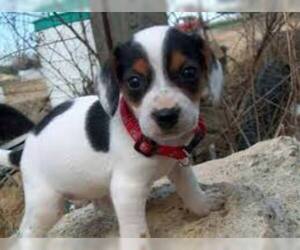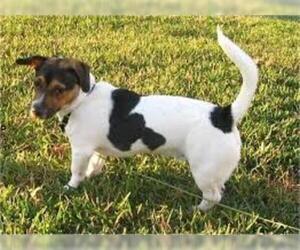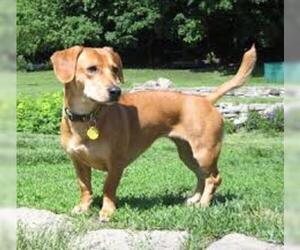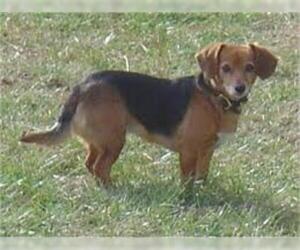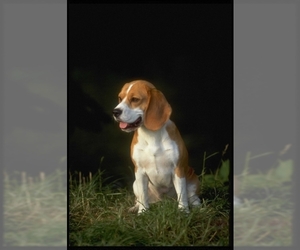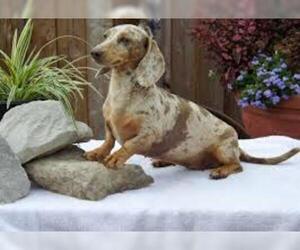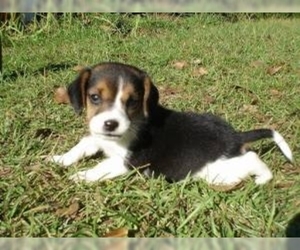
All about Doxle dog breed
A.K.A. :Doxie Beagle, Beagle Doxie, Beagle Weenie, Weenie Beagle, Dachsbeagle, Beaschund
Size
Grooming requirements
Exercise requirements
Good with other dogs
Watchdog ability
Energetic
Training requirements
Playful
Affectionate
Good with other pets
Good with children
Good with strangers
Winter
Summer
Healthiness
Protective
Life Span
| Mixed Breeds | Member |
| Breeds A - Z | D |
| Breeds by Group | Hound Hunting |
| Breeds by Trait | Good With Kids Low Shedding |
| Overview: | The Doxle, an endearing hybrid of the Beagle and Dachshund, is a relatively new designer breed that emerged from the desire to combine the best traits of its parentage. Typically a small to medium-sized dog, Doxles often inherit the long, low body of the Dachshund with the floppy ears and distinctive coloring of the Beagle, though their appearance can vary. Their temperament is generally a delightful mix: the Beagle's friendly and curious nature blends with the Dachshund's loyalty and playful spirit, making them wonderful family companions. They are known for being affectionate and intelligent, though they can possess a stubborn streak and the Beagle's propensity for scent-following. Doxles adapt well to various living situations, including apartment living, provided they receive adequate daily exercise to manage their energy levels and prevent boredom. While generally healthy, potential owners should be aware of health concerns prevalent in their parent breeds, such as back issues (intervertebral disc disease) from the Dachshund side and epilepsy or ear infections from the Beagle. |
F.A.Q.
All You Need to Know About the "Doxle" Breed (parent breeds: "Beagle" × "Dachshund")
The Doxle, a charming cross between the inquisitive Beagle and the spirited Dachshund, is a relatively new designer breed gaining popularity for its unique blend of traits. Originating from companion breeding, these intelligent and affectionate dogs are known for their playful yet loyal temperament, making them wonderful family pets. Physically, Doxles typically inherit a medium build, often with a longer body, short legs, and expressive eyes, weighing between 15-30 pounds. Their short, easy-care coat requires minimal grooming, usually a weekly brush. While adaptable, their moderate exercise needs include daily walks and playtime to keep them happy and prevent boredom. They can be suitable for apartment living with proper exercise, but their Beagle parentage may lead to vocal tendencies. Potential owners should be aware of common health considerations such as back issues (like IVDD) and hip or elbow dysplasia, consistent with their parent breeds. The Doxle is an engaging companion for those seeking a loving and moderately active canine friend.The average weight for a Doxle is between 15-30 pounds. This healthy weight for Doxle can vary, with males often being slightly larger than females. Factors like parent size and individual build can also influence the Doxle weight.
What is the average height of a Doxle?
The average Doxle height typically falls within a range of 9 to 12 inches when measured at the shoulder. As a charming cross between a Beagle and a Dachshund, the Doxle inherits a compact yet sturdy build. This makes them a fantastic medium-small companion for various living situations.When considering how tall is a Doxle, it's helpful to remember that individual genetics play a significant role. You might find some Doxles slightly shorter or a bit taller than the average, depending on which parent breed's genes are more dominant in their physical traits.While there isn't a dramatic difference in Doxle size based on gender, male Doxles may occasionally be at the higher end of the height range, while females tend to be closer to the middle or lower end. However, this variation is often subtle. For potential adopters or buyers comparing breed dimensions, knowing this general adult height range provides a clear picture of what to expect from your future Doxle companion!The Doxle colors are as diverse as their parent breeds! You'll commonly find Doxles in black and tan, lemon, red, chocolate, and cream. Many also exhibit bicolor or tricolor patterns, often with white markings. While the Doxle itself is not an AKC-recognized purebred, its parent breeds, the Beagle and Dachshund, guide the acceptable color range. For Beagles, AKC recognizes any true hound color, including black, tan & white (tricolor), red & white, and lemon & white. Dachshunds are accepted in solid red, cream, black and tan, chocolate and tan, blue and tan (a dilute color), and wheaten, as well as patterned coats like dapple (merle), brindle, and sable.Rare Doxle coat types and exotic Doxle variations can include blue (a dilute black), isabella/lilac (a dilute chocolate), and merle (often called dapple in Dachshunds). Merle Doxles display patches of lighter color on a darker base, which can be striking but prospective owners should be aware of potential health considerations associated with the merle gene, especially in double merles. While these rarer colors are beautiful, they are not standard for the parent breeds and may come with a higher price tag. Always inquire about the genetic health of puppies with rare coat colors. Understanding AKC recognized Doxle colors through the lens of its parent breeds helps assess authenticity and potential genetic backgrounds.
The Doxle, a spirited cross between a Beagle and a Dachshund, inherits a charming, inquisitive personality. They are generally friendly and outgoing, often forming strong bonds of loyalty with their families. Their sociability extends to meeting new people, though early socialization is key. While they enjoy activity, their adaptable size means they can manage apartment living if provided with regular walks and mental stimulation. With children, Doxles are typically good-natured and playful, but supervision is always recommended, especially with younger children, due to their smaller size. Regarding other pets, Doxles can coexist well, particularly if raised together, though their Beagle heritage can sometimes manifest as a prey drive towards very small animals. Expect a clever, sometimes stubborn, but ultimately affectionate companion. For more on the Doxle personality and temperament of Doxle, consider their parent breeds' traits.
The Doxle temperament combines the Beagle's friendly nature with the Dachshund's spirited personality, resulting in a charming companion dog. They are generally friendly and sociable, eager to be part of the family's activities, making them excellent family pets. Doxles are known for their loyalty and can form strong bonds with their owners. While often adaptable, their small to medium size and moderate energy levels make them suitable for apartment living, provided they receive daily walks and playtime. With children, Doxles are typically good-natured, especially if raised with them and socialized early. Supervision is always recommended with very young children due to their smaller size. Their behavior with other pets is generally positive, particularly if introduced properly; however, their Dachshund lineage might give them a bit of a prey drive towards smaller, non-canine animals, so careful introductions are key. Doxles can exhibit a touch of the Dachshund's stubbornness, especially during training, requiring patience and consistent, positive reinforcement methods. They can also be somewhat sensitive to harsh corrections. Early socialization and consistent training are vital for shaping their personality traits into a well-behaved and happy member of the household. Overall, the Doxle is a loving, playful, and alert breed, making a wonderful addition to many homes.
Doxle Care: A "Doxle" (Beagle × Dachshund mix) is generally a low-maintenance companion. Daily maintenance includes regular feeding of a high-quality kibble appropriate for their size and activity level; monitor intake carefully to prevent obesity, a common issue. Exercise needs are moderate; short daily walks and playtime suffice as they are often a low-energy dog breed. Avoid strenuous activity, especially in extreme heat or cold, due to potential brachycephalic tendencies (inherited from the Dachshund's elongated snout and sometimes shorter-faced Beagle lineage). Grooming is straightforward: weekly brushing helps manage shedding and keep their coat healthy. Pay close attention to ear hygiene, cleaning weekly to prevent infections, and check for any skin folds (if present) that may require gentle cleaning to avoid irritation. Dental care is crucial; daily brushing or dental chews are recommended to combat plaque and tartar buildup, as small breeds are prone to dental disease. Common health concerns for how to care for a Doxle include intervertebral disc disease (IVDD) due to their elongated spine, skin allergies, and patellar luxation. Regular vet check-ups are essential for early detection and preventative health tips for Doxle. They are sensitive to extreme temperatures, so always provide a sheltered, comfortable environment.
Doxle Activity Level: How Active Are Doxle?The Doxle exhibits a moderate Doxle activity level, balancing short bursts of playful energy with extended periods of rest. They are generally more energetic than a Dachshund but less demanding than a Beagle, making their exercise needs manageable for most households.Typically, Doxles enjoy several short walks throughout the day, totaling around 30-60 minutes of daily exercise. They thrive on interactive playtime, such as fetch in the yard or indoor games, which satisfies their hunting instincts from their Beagle lineage. Their curious and intelligent nature also benefits from mental stimulation through puzzle toys or training sessions.While not suitable for highly active families seeking a jogging or hiking partner, Doxles can certainly accompany their owners on leisurely strolls and enjoy exploring new scents. They are suitable for low-to-moderately active households that can provide consistent, engaging play and regular outdoor excursions.It's important to note the potential limitations due to their brachycephalic (short-nosed) anatomy. While not as pronounced as some other breeds, Doxles can be prone to overheating, especially in warm weather or during strenuous activity. Always monitor their breathing and avoid overexertion to ensure their safety and comfort. They are adept at knowing when to rest and will happily curl up for a long nap after a good play session, demonstrating their balanced energy approach.
Although Doxles are not extreme brachycephalic dogs, some may inherit a slightly shortened muzzle from their Beagle side, making them mildly prone to Brachycephalic Obstructive Airway Syndrome (BOAS). Applying brachycephalic dog care strategies—such as avoiding strenuous activity in hot weather, using a harness instead of a collar, and monitoring breathing during exercise—can help reduce respiratory stress. Their compact build and active temperament also contribute to heat sensitivity, so they should always have access to shade, water, and cool resting areas.
Understanding how to keep Doxle healthy involves scheduling regular veterinary checkups, early screening for joint, spinal, and respiratory conditions, maintaining a balanced diet to prevent obesity, and providing moderate but consistent exercise that avoids excessive jumping or climbing. Grooming routines should include brushing to reduce shedding, cleaning ears and skin folds, and dental care to prevent oral disease. With attentive care, Doxles can enjoy a playful, loyal life of 12–15 years.
Breed Breakdown: What Experts Say About the Doxle
I'd rate the "Size" trait of the Doxle a 3.Doxles are a cross between Beagles and Dachshunds, both of which are small to medium-sized breeds. This hybrid typically inherits a compact, muscular build, with an average height ranging from 8 to 12 inches and a weight between 15 and 30 pounds. They are noticeably larger than toy breeds like Chihuahuas but significantly smaller than standard medium breeds like Australian Shepherds or even larger terriers. Their relatively short legs and long bodies contribute to their lower profile, making them feel smaller even at the higher end of their weight range. This makes them exceptionally well-suited for apartment living, as they don't require extensive space. Their manageable size also makes them great companions for travel, fitting comfortably in carriers or on laps. They are an excellent choice for households with space constraints, as they won't feel cramped in smaller environments.
I'd rate the Doxle's grooming requirements a 4.This breed generally falls on the lower-to-moderate end of the grooming spectrum. Their short, dense coat, inherited from both the Beagle and Dachshund, means they are not prone to matting and require only weekly brushing to remove loose hair and keep their coat healthy. While they do shed moderately year-round, it's manageable with routine brushing and isn't excessive. Their ears, particularly if they take after the Dachshund's longer, floppier ears, will need regular checking and cleaning to prevent wax buildup and infections, but this is a standard requirement for many breeds with pendulous ears. Nail trimming every 3-4 weeks is also standard. They typically don't have extensive skin folds requiring specialized care, and their bathing needs are relatively infrequent, perhaps every 4-6 weeks or as needed. While individual Doxles can inherit sensitivities, they aren't inherently known for widespread skin issues or allergies more than other breeds, making them generally easy to care for without requiring frequent, specialized grooming compared to many long-haired or thick-coated companion dogs.
The Doxle would rate around a 6 for exercise requirements.This is because the Beagle parent brings a moderate to high energy level, a strong scent drive, and good stamina, making them keen on walks and outdoor exploration. The Dachshund, while smaller, also has a surprising amount of energy and a love for digging and chasing, though their long backs can limit high-impact activities. A Doxle will likely inherit a good deal of the Beagle's playful spirit and curiosity, meaning they won't be content with just a quick potter around the garden. They'll thrive with at least two moderate walks a day (30-45 minutes each), incorporating opportunities for sniffing and perhaps some off-leash play in a secure area. While they aren't marathon runners and won't typically need intense agility training, they do require consistent activity to prevent boredom and maintain a healthy weight, especially given the Dachshund's predisposition to back issues with excessive weight. They are generally tolerant of sustained movement but won't have the boundless energy of a true working breed. Their respiratory limitations are typically low unless a specific Dachshund parent lineage carried extreme conformation, making intense, prolonged exertion less advisable than for a breed with a more open airway, but this isn't a primary concern for typical daily exercise. Without structured routines, a Doxle could become restless and prone to destructive behaviors or excessive barking, needing mental stimulation alongside physical activity through games and training.
I would rate the Doxle's "Watchdog Ability" at a 7 out of 10.Doxles, inheriting traits from both Beagles and Dachshunds, are generally alert and possess a strong inclination to vocalize. Their Beagle lineage contributes to a keen sense of smell and an inherent desire to follow intriguing scents, which can make them quite aware of their surroundings. Dachshunds are famously territorial and not shy about using their voice to alert their owners to anything they perceive as out of the ordinary. This combination results in a dog that is likely to bark at unfamiliar sounds or people approaching the home. They are not typically aggressive, but their persistent barking can certainly serve as a meaningful early warning system, deterring potential intruders by drawing attention to their presence. They are more than just passive companions; they are capable of providing consistent auditory alerts. While they may not be the most physically imposing deterrent, their vigilance and vocal nature make them effective at signaling an unusual presence.
The Doxle, a blend of Beagle and Dachshund, rates a 6 out of 10 for "Good with Other Dogs."This moderate rating reflects the mixed bag of traits inherited from its parent breeds. Beagles are generally known for their pack mentality and tend to be quite sociable and friendly with other dogs, often enjoying canine company and adapting well to multi-dog households. Their outgoing nature usually makes them accepting of various sizes and energy levels.However, the Dachshund influence introduces a more complex dynamic. Dachshunds, while not inherently aggressive, can exhibit a strong prey drive and a tendency towards bossiness or territoriality, especially if not well-socialized. They can sometimes be less tolerant of boisterous play or perceived challenges, and their independent streak might make them less inclined to "go with the flow" in a group. They may also be more prone to resource guarding if not trained effectively.Therefore, a Doxle's compatibility with other dogs largely depends on which parent's temperament is more dominant and, crucially, on early and consistent socialization. A Doxle that leans more towards the Beagle's nature will likely thrive in canine company, enjoying playful interactions and adapting well. One that inherits more of the Dachshund's traits might require careful introductions, supervision, and ongoing training to ensure peaceful coexistence, particularly with unfamiliar dogs or those with very different play styles. They are not typically highly incompatible, but they aren't universally dog-friendly either; their sociability often requires an investment in proper socialization and management.
The Doxle, a mix of Beagle and Dachshund, typically rates around a 7 out of 10 for the "Energetic" trait. This hybrid inherits a good dose of energy from both parent breeds. Beagles are known for their boundless curiosity, strong scent drive, and need for moderate to high levels of activity. Dachshunds, while smaller, also possess surprising stamina and a playful, tenacious spirit. Consequently, Doxles are generally active and engaged dogs that enjoy regular walks, playtime, and mental stimulation. They are far from laid-back couch potatoes and will thrive with daily opportunities to explore and burn off energy. Their playfulness often manifests in enthusiastic games and a keen interest in their surroundings.However, the Dachshund side of their lineage, particularly if they inherit a longer back, can make them somewhat prone to back issues, and they are not typically built for intense, high-impact athletic activities. While not severely brachycephalic, some Doxles may inherit a slightly shorter snout from the Dachshund, which could potentially have a minor impact on very prolonged or intense exercise tolerance in hot weather, though this is less of a concern than with true brachycephalic breeds like Pugs or Bulldogs. Their endurance is generally good for typical companion dog activities, but they are unlikely to be marathon runners. They require consistent physical stimulation to prevent boredom and destructive behaviors, but their needs are usually met with regular walks and engaging play sessions rather than extreme athletic endeavors.
I would rate the "Training Requirements" of the Doxle at a 6 out of 10.While intelligent, both Beagles and Dachshunds bring a fair amount of stubbornness and independent thinking to the Doxle mix. Beagles are notoriously scent-driven, which can make focusing on commands challenging in distracting environments, as their attention span can be easily diverted by interesting smells. Dachshunds, bred for hunting, also possess a strong will and can be quite persistent when they want something. This combination means that while Doxles are capable of learning, they often require significant consistency, patience, and a well-structured routine. They respond very well to positive reinforcement, such as treats and praise, but you'll need to be creative and persistent to keep them engaged. This breed is not necessarily beginner-unfriendly, but new owners should be prepared for a consistent and sometimes challenging training journey. While not highly demanding or time-intensive as some working breeds, they certainly require more than minimal effort and will test your resolve.
I would rate the "Playful" trait of a Doxle at a solid 8 out of 10. Doxles are generally very spirited and engaging dogs, inheriting a good deal of their playful nature from both parent breeds. They typically possess a lively energy level that encourages them to be active participants in games and family interactions. You can expect a Doxle to show a genuine love for games like fetch, a keen interest in exploring with their nose, and a high responsiveness to toys. Their attention-seeking behavior is often manifested through gentle nudges or bringing you a favorite toy, as they thrive on being involved with their human companions. While not as relentlessly hyper as some working breeds, their overall enthusiasm for daily life is high, and they enjoy being challenged mentally with puzzle toys or short training sessions. They are naturally more spirited than laid-back, always up for a bit of fun or a cuddle on the couch after an engaging playtime.
I'd rate the "Affectionate" trait of the Doxle an 8 out of 10.Doxles typically inherit a strong desire for human companionship from both parent breeds. They are known for being very loving and people-oriented, thriving on affection and often forming deep bonds with their families. Owners can expect a Doxle to enjoy physical closeness, frequently seeking out lap-sitting opportunities and snuggling up for cuddles. Their loyalty is generally high, and they tend to be quite sensitive to their owner's emotions, offering comfort or seeking attention when they sense a mood shift. Furthermore, Doxles often exhibit the "Velcro dog" tendency, happily following their favorite family members from room to room. While not entirely dependent to the point of severe separation anxiety in most cases, they definitely prefer being with their people and are far from independent when it comes to emotional connection, making them a breed that truly thrives on consistent affection.
I'd rate the "Good with Other Pets" trait of the Doxle a 6 out of 10.Doxles often inherit a blend of traits from their Beagle and Dachshund parents, which can make their compatibility with other pets somewhat variable. Beagles are generally known for being good-natured and sociable with other dogs, often enjoying canine companionship. However, they also possess a strong prey drive, which can extend to smaller animals like cats or rabbits, requiring careful management and early socialization. Dachshunds, while often affectionate with their human families, can be more independent and sometimes prone to jealousy or resource guarding, especially if not properly socialized. They also have a notable prey drive.This combination in a Doxle means that while they *can* be very friendly with other dogs, especially if raised with them from a young age, their Beagle scent hound tendencies can lead to chasing smaller pets. Their Dachshund influence might introduce a stubborn streak or a tendency to assert dominance, particularly if another dog challenges them. Therefore, early and consistent socialization is absolutely crucial for a Doxle to coexist peacefully in a multi-pet household. They are not *naturally* extremely pet-friendly across the board without effort. While they are often playful and can adapt, their prey drive and potential for resource guarding necessitate supervision and ongoing training to ensure harmonious relationships with other animals, particularly cats or small pocket pets. With proper introductions, training, and supervision, they can be good companions, but their instincts mean it won't always be effortless.
I'd rate the Doxle's "Good with Children" trait a 7 out of 10.Doxles often inherit a playful and affectionate nature from both parent breeds, making them generally enjoyable companions for children. Beagles are known for their jovial energy and love of games, while Dachshunds, despite their sometimes-stubborn streak, can be very devoted to their families. This combination often results in a dog that enjoys playtime and cuddles. They tend to be relatively patient with the boisterousness of older children and can tolerate a fair amount of noise, particularly if they are well-socialized from a young age.However, the rating isn't a perfect 10 due to a few considerations. Dachshunds can be prone to back issues, so careful handling is crucial, and younger children would need strict supervision to ensure they don't accidentally injure the dog. Furthermore, Doxles can inherit the Dachshund's stubbornness or the Beagle's independent scent drive, meaning consistent training and boundaries are important to ensure they are well-behaved around children. While not naturally aggressive, without proper socialization and guidance, they might be less tolerant of over-enthusiastic toddlers. They generally thrive in a family setting with training and supervision, but their temperament leans more towards playful and loving than inherently gentle and constantly tolerant, especially with very young children who may not understand boundaries.
Rating the "Good with Strangers" trait of the Doxle breed, a cross between a Beagle and a Dachshund, would be a 7.Doxles generally inherit a blend of their parent breeds' social tendencies. From the Beagle, they often get a friendly and curious nature, making them more open to new people. Beagles are typically quite outgoing and enjoy interacting with humans. However, the Dachshund side can introduce a degree of wariness or reservedness. Dachshunds, while loyal to their families, can be more aloof with strangers and may be prone to barking as a warning.A Doxle is likely to be friendly and approachable with unfamiliar adults, often showing a wagging tail and an eagerness to sniff and investigate. They are not typically aggressive or unfriendly. However, they might exhibit an initial period of observation or a few barks as an alert before warming up, a characteristic often seen in Dachshunds. This initial caution is usually brief, and with proper socialization from a young age, they can become quite welcoming. In guest-filled environments, a well-socialized Doxle will likely enjoy the attention and treats, though they might occasionally bark at sudden movements or noises. While naturally inclined to be friendly, consistent positive exposure to various people and situations is beneficial to ensure they are comfortable and adaptable with strangers, rather than relying solely on their innate disposition.
I would rate the Doxle's winter tolerance as a 4.While the Doxle inherits some hardiness from the Beagle, the dominant Dachshund influence significantly impacts its cold-weather resilience. Their short, smooth coat, inherited from both parents, offers minimal insulation against the cold. Their small size and proximity to the ground mean they lose body heat more quickly, and their longer bodies, a prominent Dachshund trait, can make them more susceptible to cold on their underside. While they may have a modest layer of body fat, it's not substantial enough to counteract the lack of coat thickness. They are not brachycephalic, so breathing in cold air isn't a primary concern, but their overall physiology makes them prone to hypothermia in sustained cold. Compared to many other companion dogs, Doxles absolutely require special care during winter months. They are not built for prolonged exposure to freezing temperatures and will likely need sweaters or coats for walks, shorter outdoor excursions, and may even shiver indoors if the house isn't kept warm enough. They are much better suited for quick potty breaks and then returning to a warm environment, rather than extended playtime in the snow.
I'd rate the Doxle's summer tolerance a 4. While not as severely brachycephalic as some breeds, the Dachshund parentage can introduce a slightly elongated soft palate or more compact airways, making them more prone to respiratory issues in the heat. Beagles are generally more robust, but Doxles inherit the shorter legs from the Dachshund, placing their bodies closer to the hot ground, and both parent breeds can be prone to obesity, which significantly increases heatstroke risk. They struggle to regulate body temperature as effectively as more athletic, longer-snouted breeds. Outdoor activity should be strictly limited to cooler parts of the day, and they absolutely require climate control during hot weather. Doxles require special care in summer months compared to many other companion dogs due to their combined genetic predispositions to overheating and the physical challenges presented by their build.
I'd rate the Doxle's "Healthiness" trait a 6.5 out of 10.Doxles benefit from the hybrid vigor often seen in mixed breeds, meaning they can be healthier than either of their purebred parents due to a wider gene pool. However, they are still susceptible to some of the common health concerns found in Beagles and Dachshunds. From the Beagle side, they might inherit a predisposition to hip and elbow dysplasia, epilepsy, and certain eye conditions like glaucoma. From the Dachshund side, the most significant concern is intervertebral disc disease (IVDD) due to their elongated backs, which can lead to paralysis. Obesity, a common issue in both parent breeds, can exacerbate back problems and other health issues. Skin allergies and ear infections can also occur.Their life expectancy is generally good, typically ranging from 12 to 15 years with proper care. While not considered extremely high-maintenance, responsible breeding practices that screen for inherited conditions are crucial. Owners need to be diligent about weight management, providing appropriate exercise that avoids excessive jumping, and being aware of early signs of back problems. Compared to breeds with severe brachycephalic issues or extremely fragile joints, Doxles are generally robust, but their unique body structure does require a degree of preventive care and attentive ownership to maintain optimal health.
I would rate the "Protective" trait of the Doxle breed at a 4 out of 10.While Doxles are incredibly loyal and devoted to their owners, and their Dachshund parentage can contribute to a vocal nature, making them decent alert systems, they are generally not considered truly protective in the sense of offering meaningful physical protection in a household setting. Their alertness might manifest as barking at strangers or unusual sounds, fulfilling a watchdog role by alerting you to something amiss. However, their small to medium size, friendly disposition inherited from the Beagle, and lack of a strong guard dog instinct mean they are more likely to be curious or even attempt to befriend an intruder rather than confront them. Their territorial instincts are present but not aggressive, primarily stemming from their loyalty to their "pack." They are overwhelmingly companion dogs, excelling in providing affection and companionship rather than acting as a deterrent or defense against a threat.
I would rate the Doxle's "Life Span" trait a 7 out of 10.Doxles, inheriting genetics from both Beagles and Dachshunds, generally enjoy an average to slightly above-average lifespan for a companion dog. Beagles typically live for 10-15 years, while Dachshunds often live 12-16 years. This places the Doxle's expected lifespan in the range of 10-14 years, with many living even longer with proper care. While not exceptionally long-lived, this is a solid lifespan, exceeding that of many larger breeds. Common health issues that could impact longevity include intervertebral disc disease (IVDD) from the Dachshund side, and hip/elbow dysplasia or certain eye conditions from the Beagle side, as well as obesity if not properly managed. However, responsible breeding practices can screen for these genetic predispositions, and attentive care, including a balanced diet, regular exercise, and routine veterinary check-ups, significantly contributes to their overall health and longevity. Therefore, while they have some predispositions, their typical lifespan is quite respectable, making them a good choice for owners seeking a companion for a significant period.
Doxle Dogs for adoptionSee all dogs for adoption
Doxle BreedersSee all breeders
Similar Dog Breeds for Doxle
Quick Breed Selector 0 - not important, 1 - smallest, 10 - largest
Variants & Mistakes :Doxel, Doxl, Doxlie, Doxcel, Doxil, Doxiel, Doxal, Doxell, Doxley, Daxle, Doexle, Doxlee, Doxul, Doxile, Dokle, Docsel, Dosle, Doxyle, Dxle, Doxlle, Doxe
